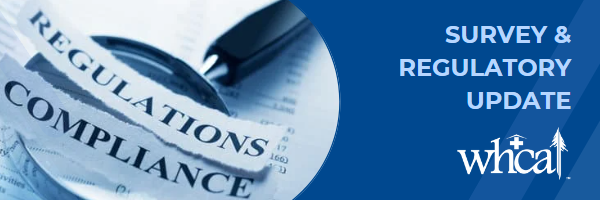Apr 3 2022 | Resident Rights – Visitation
Over the last two years, no topic has been more controversial and frequently altered than the guidance surrounding resident visitation. With the retirement of the LTC Safe Start Plans and the adoption of the LTC COVID Response Plans, visitation remains an area of confusion for some facilities. It is important at this time to revisit the actual requirements that are in place related to visitation.
Primarily, facility leaders and staff must have a clear understanding of the resident’s rights regarding visitation. Those rights are the basis of the facility’s policy and procedures that staff will follow and of which residents/families are informed. Keep in mind that the Centers for Medicare & Medicaid Services (CMS) Requirements of Participation make it clear that the resident is the “locus of control” and the facility’s responsibility to “protect and promote” the rights of residents is paramount.
According to CFR 483.10 Resident Rights, F562 and F563, the resident has the right to receive visitors of his/her own choosing at the time of their choosing and in a manner that does not impose on the rights of another resident. The requirements further clarify that the facility must provide IMMEDIATE access to a resident by immediate family, other relatives of the resident, and others that are visiting with the consent of the resident (subject to the resident’s right to withdraw/deny).
The federal requirements state the facility must have written policies and procedures regarding the visitation, including any clinically necessary or reasonable restrictions. Also, the facility must inform each resident (or representative) of the resident’s visitation rights and facility policy, including any restrictions. All staff must be trained and have a clear understanding of their role in promoting and protecting resident rights.
Washington State regulation regarding these circumstances is, of course, Resident Rights, RCW 70.129. It is becoming increasingly a focus and priority for facilities to ensure that residents maintain their independence, rights, and choices. This includes who they visit with in their home and when. According to the resident rights’ statute, the resident has the right and the facility MUST NOT interfere with access to any resident by the following:
- Any representative of the state.
- The resident’s individual physician.
- The state long term care ombuds.
- The agency responsible for the protection and advocacy system for individuals with developmental disabilities.
- The agency responsible for the protection and advocacy system for individuals with mental illness.
The regulation further includes, subject to reasonable restrictions to protect the rights of others and to the resident’s right to deny or withdraw consent at any time, immediate family or other relatives of the resident and others who are visiting with the consent of the resident.
The key phrases in the above section are “reasonable” and “protect the rights of others.” Under these circumstances, a facility can place reasonable restrictions. Each case should be evaluated with these words in mind and should be consistent with the facility’s policy and procedures.
RCW 70.129 also states the resident has the right to personal privacy including accommodations and meetings of family and resident groups. This does not require the facility to provide a private room for each resident; however, a resident cannot be prohibited by the facility from meeting with guests in his or her bedroom if no roommates object.
The facility MUST provide reasonable access to a resident by his or her representative or an entity or individual that provides health, social, legal, or other services to the resident, subject to the resident’s right to deny or withdraw consent at any time.
Facilities are encouraged to evaluate each situation individually, keeping in mind that resident advocacy and protection is the primary focus. It is often beneficial, when faced with a difficult visitation situation, to first discuss it with the resident openly and honestly to the extent they can participate. Seek what the resident’s needs, wants, and concerns may be regarding this relationship/visitation. Attempt to come to a negotiated agreement that supports both the resident’s need for contact/visitation and the facility’s concerns.
The facility may need to facilitate a care conference or family meeting. There may be a need to contact the local ombuds or advocate for assistance. If the resident desires visitation from an individual known to be abusive, the facility will want to involve Adult Protective Services. No two scenarios are exactly alike, nor are the solutions.
While the above paragraphs review the requirements for visitation, facilities now have the extra challenge brought on by the COVID pandemic. CMS has issued QSO-20-39-NH REVISED (cms.gov), which clearly states “visitation is allowed for all residents at all times.” As of March 10, 2022, CMS has updated the FAQ document related to visitation, vaccination status, and COVID. As noted in the LTC COVID Response Plans facilities need to continue with visitor screening, social distancing, and source control. Facilities must also have adopted and implemented plans related to compassionate care and essential support persons. If you have questions, please email Elena Madrid or call her at (800) 562-6170, extension 105.
Posted in Skilled Nursing Facilities, Survey & Regulatory

